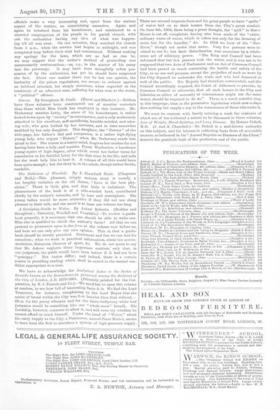We have to acknowledge the Analytica Index to the Series
of Records known as the Remembrancla Preserved among the Archives of the City of London, A.D. 1579-1661. (Privately printed for the Cor- poration, by E. J. Francis and Co.)—Wo need but to open this volume at random, to see how full of interesting facts it is. We and the Lord Treasurer, for instance, complaining to the Lord Mayor that the assize of breed within the City was 2 oz. heavier than that without,- 22 oz. for the penny wheaten and for the three-halfpenny white loaf (wheaten would be something like our " vvholo-meal " bread). His Lordship, however, consents to allow it, and will even try whether he cannot afford as much himself. Under tho head of "Water," about the early supply to the City, a Dutchman, named Peter Morice, seems to have boon the first to introduce a system of high-pressure supply. There are several requests from and for grout people to have " quills " of water laid on to their houses from the City's great conduit. On June 8th, 1608, there being a great drought, the " quill " to Essex House is cut off, complaints having also been made of the "extra- ordinary waste of water, which is taken not only for the dressing of meat, but for the laundry," &e. In 1616 we hear of the "New River," though not under that name. Very few persons wore in- clined to use it ; but their disinclination was overcome by a whole- some act of arbitrary power. "The King and Council had been informed that but few persons took the water, and it was not to be supposed that two Acts of Parliament and an Act of Common Council had been passed so much concerning the health and safety of the City, to no use and purpose, except the prejudice of such as were by the City deputed to undertake the work, and who had deserved so well of the public. His Majesty had therefore commanded, and the Council accordingly required, the Court of Aldermen to provide, by Common Council or otherwise, that all such houses in the City and Liberties as either of necessity or convenience might use the same water, should be required to do so." There is a much sounder ring in this language, than in the permissive legislation which now-a-days does nothing but supply a sop to the consciences of those who make it.






























 Previous page
Previous page